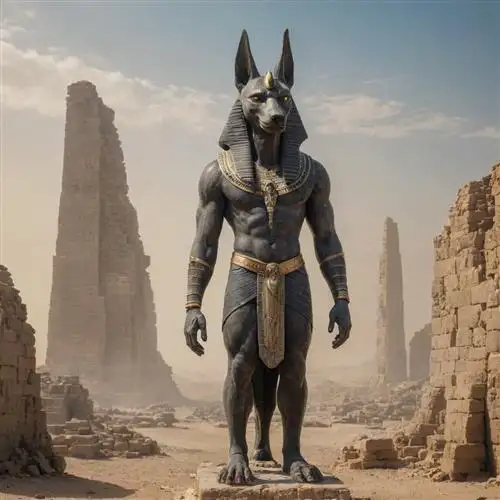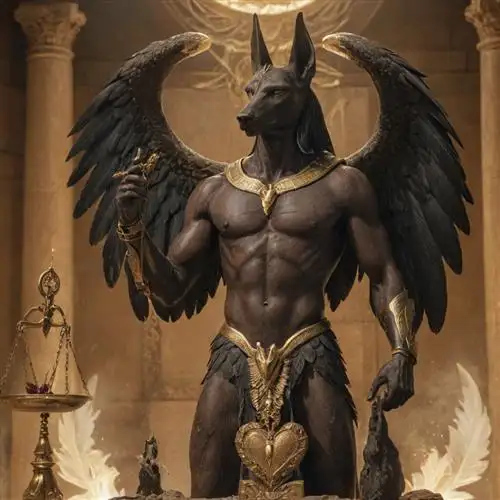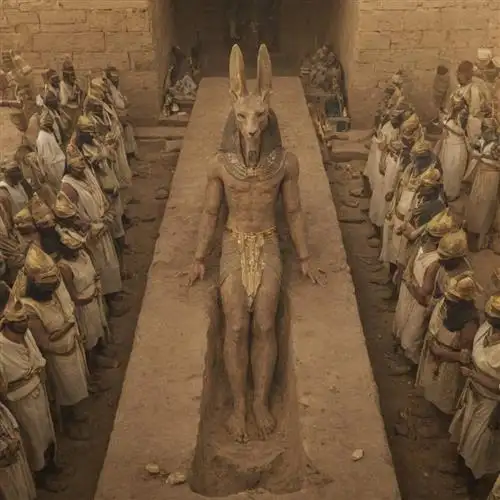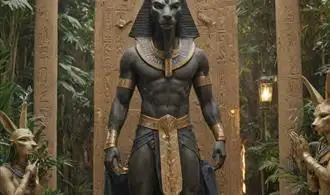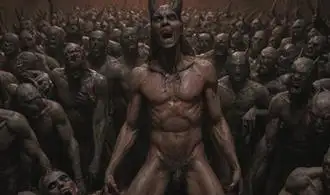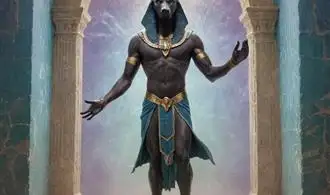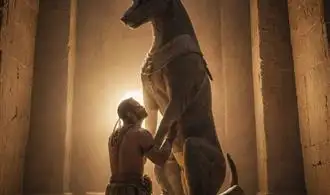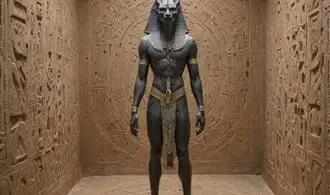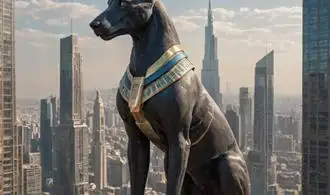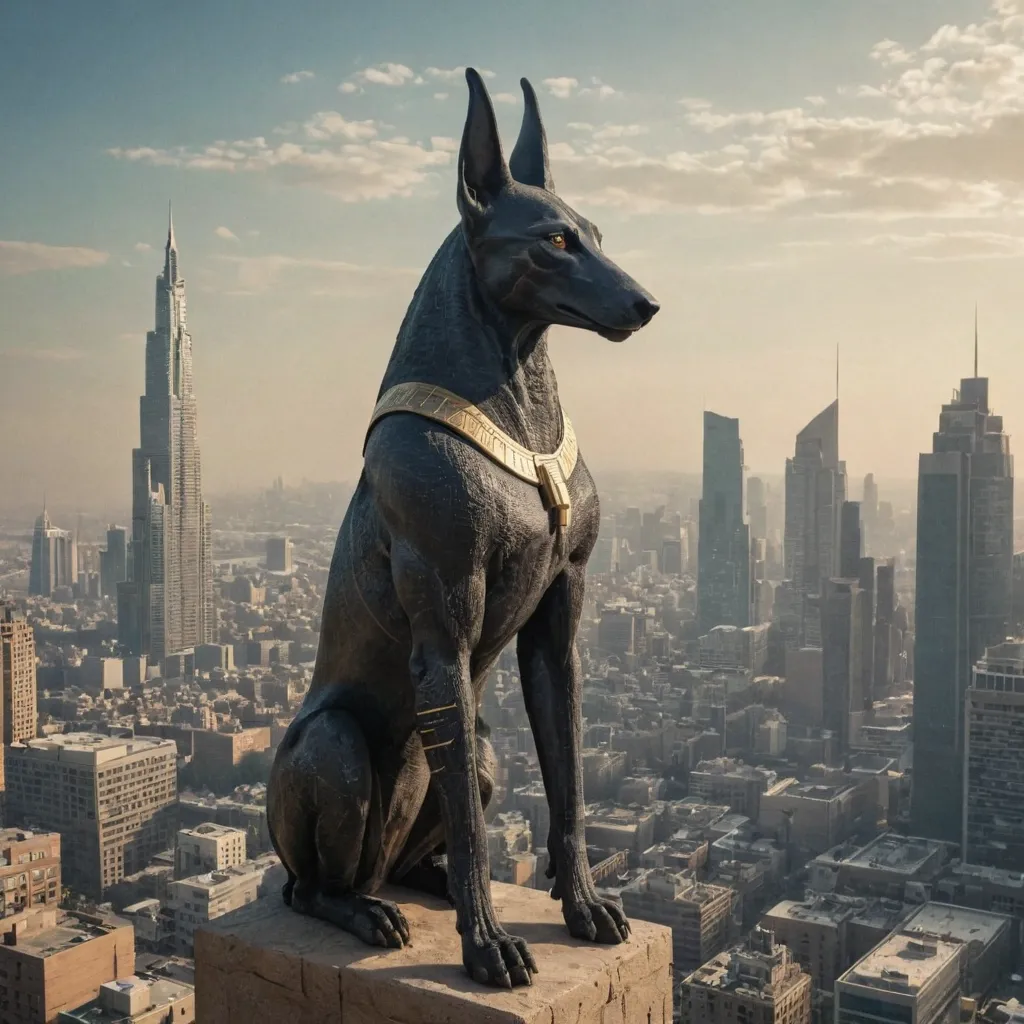
The Origins of Anubis
Anubis, the enigmatic Egyptian god of death and the afterlife, has long been the subject of fascination and misconception. As a professional content writer, I am excited to delve into the origins of this profound deity and shed light on the intricate role he played in the ancient Egyptian worldview.
The origins of Anubis can be traced back to the predynastic period of ancient Egypt, where he was known as Anpu or Inpu. This early incarnation of the god was likely associated with the jackal or wild dog, animals known to inhabit the desert regions and scavenge near burial sites. This connection to the natural world and the realm of the dead likely formed the foundation for Anubis's later development as the guardian of the necropolis and the embalming process.
As the ancient Egyptian civilization evolved, so too did the role and significance of Anubis. By the time of the Old Kingdom (c. 2686-2181 BCE), Anubis had become firmly established as a central figure in the funerary rituals and beliefs of the Egyptian people. He was responsible for the embalming and mummification of the deceased, ensuring their safe passage to the afterlife.
Anubis's role in the afterlife was equally crucial. He was believed to preside over the weighing of the heart ceremony, a critical step in the judgment of the deceased. During this ritual, the heart of the deceased was weighed against the feather of truth, representing the moral and ethical conduct of the individual. Anubis, with his jackal-like head, would oversee this process, ensuring the deceased had lived a virtuous life worthy of eternal rest in the afterlife.
The iconography and symbolism associated with Anubis further underscores his importance in ancient Egyptian culture. The jackal-headed figure, often depicted in a kneeling or recumbent position, was a common sight in funerary art and architecture. Additionally, Anubis was sometimes represented by the image of a black jackal, a color that may have held deep symbolic meaning related to the regenerative powers of the afterlife.
Anubis Role in Egyptian Mythology
Anubis, the ancient Egyptian deity associated with death, the afterlife, and mummification, has long been a figure of fascination and misunderstanding. Often depicted as a jackal-headed god, Anubis played a crucial role in the intricate web of Egyptian mythology and the beliefs surrounding the journey of the soul after death.
Anubis' role in Egyptian mythology was multifaceted and profound. He was responsible for guiding the deceased through the process of mummification, ensuring the proper preparation of the body for its journey to the afterlife. This meticulous process, which involved the removal of internal organs and the application of various preservative substances, was essential in the Egyptian belief system, as it was thought to aid the soul's transition to the next world.
Beyond his role in mummification, Anubis was also tasked with overseeing the weighing of the heart ceremony, a pivotal moment in the Egyptian afterlife. In this ritual, the deceased's heart was weighed against the feather of truth, representing the individual's moral and ethical conduct during their lifetime. If the heart was found to be pure, the soul would be granted passage to the afterlife; if it was deemed too heavy with sin, the soul would be condemned to eternal damnation.
Anubis' association with death and the afterlife also extended to his role as a protector of the deceased. He was believed to stand guard over the tombs of the dead, ensuring the safe passage of the soul and preventing any desecration or disturbance of the deceased's final resting place. This protective aspect of Anubis' character was highly revered by the ancient Egyptians, who sought his divine favor and intercession in the afterlife.
Interestingly, Anubis' role in Egyptian mythology also encompassed aspects of healing and transformation. As the god of mummification, he was believed to possess the power to restore and rejuvenate the body, a skill that was essential in the embalming process. This dual nature of Anubis, as both a deity of death and a deity of transformation, underscores the complexity and nuance of his character within the Egyptian pantheon.
Anubis in Ancient Egyptian Burial Rituals
Anubis, the jackal-headed god of ancient Egypt, played a crucial role in the intricate burial rituals and the journey of the deceased into the afterlife. As the protector and embalmer of the dead, Anubis' presence was paramount in guiding the souls of the departed through the complex and often treacherous process of mummification and the final rites of passage.
Mummification, a sacred and meticulous process, was overseen by the priests of Anubis, known as the "Masters of the Secret." These highly trained individuals were responsible for the preparation of the body, ensuring that the deceased was properly preserved and adorned for the journey into the afterlife. The process involved the removal of internal organs, the desiccation of the body using natron, and the wrapping of the remains in linen bandages. Throughout this intricate ritual, Anubis was invoked to protect the body and to guide the soul of the deceased through the various stages of the mummification process.
The role of Anubis extended beyond the physical preparation of the body. During the final rites, the god was believed to weigh the heart of the deceased against the feather of truth, a symbolic act that determined the worthiness of the soul to enter the afterlife. This "Weighing of the Heart" ceremony was a critical moment in the journey, as it determined whether the individual would be granted eternal life or condemned to oblivion.
Anubis' presence was further evidenced in the numerous artifacts and artwork found in ancient Egyptian tombs and burial sites. Statues, paintings, and other decorative elements often depicted Anubis in his characteristic jackal-headed form, guarding the deceased and overseeing the various stages of the burial process. These visual representations not only paid homage to the god's importance but also served as a means of invoking his protection and guidance for the departed soul.
Anubis Influence on Modern Perceptions of Death
Anubis, the enigmatic Egyptian deity of death and the afterlife, has captivated the imagination of people for millennia. While often misunderstood, his influence on modern perceptions of death is undeniable. The ancient Egyptians revered Anubis as the guardian of the dead, responsible for the crucial process of mummification and the protection of the deceased during their journey to the afterlife.
One of the most significant ways Anubis has shaped modern views of death is through his role as the psychopomp, or the guide of souls to the afterlife. This concept, deeply rooted in Egyptian mythology, has parallels in numerous other ancient belief systems, including Greek and Roman mythology. The idea of a divine figure responsible for escorting the deceased to their final resting place has profoundly influenced Western and Eastern cultures, shaping the way we perceive and grapple with the concept of death.
Moreover, Anubis' association with the mummification process has had a lasting impact on our understanding of ancient Egyptian burial practices. The meticulous attention to detail and the belief that the physical body was essential for the afterlife have contributed to our fascination with the preservation of the dead. This fascination has led to a proliferation of research, exhibitions, and popular culture representations that delve into the mysteries of ancient Egyptian funerary rites and the role of Anubis as the guardian of the mummification process.
Beyond his direct influence on ancient Egyptian practices, Anubis has also found his way into modern popular culture, further shaping our perceptions of death and the afterlife. The god's distinctive jackal-like appearance and his role as the protector of the dead have made him a recurring figure in literature, film, and video games. These depictions, while often fantastical, have helped to keep the legacy of Anubis alive and relevant in the modern era, ensuring that his influence continues to permeate our collective consciousness.

